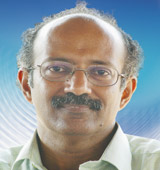career
and decent pay.Thus the
establishment of IRMA just when I
had completed my course was clearly
a chance factor that shaped my life.
Perhaps it was not just chance, but
destiny. The fact that my GRE results
were lost in post and I got a copy of
my results many months later seems
to indicate that I was not given the
kind of choices that would have
created a dilemma in me. By the time
the GRE mark list came, I was well
into my first term in IRMA and
having a whale of a time.
On completion of the prestigious
IRMA PGDRM, when you had a
choice of joining a corporate or
already established NGO in a well
paid post, what made you opt for
working with the unorganized
fishermen community with a meagre
compensation?
The question of joining a corporate
did not arise as my earlier answer
indicates that I had no interest in a
regular career in the corporate sector.
Even if I had been so inclined, the
opportunity did not present itself at
that stage. In fact, none of my
classmates from the first batch had
that option. Remember, we had a
"bond" to work for the "rural sector"
for at least three years. One or two did
"jump" the bond, but the rest of us
did initially join the "designated
organizations".
As far as choice of SIFFS is
concerned, the profile of SIFFS was
ideal for my ambitions.
During our IRMA course, we were
taught to look at ourselves as "change
agents" who use their knowledge and
managerial skills to bring changes in
society. Rural producer cooperatives
were seen as important instruments
to bring about change in the rural
areas. At the end of the first year, we
saw ourselves doing the kind of
things that National Dairy
Development Board's (NDDB's)
"Spear Head Team" Leaders were
involved in: going to rural areas and
organizing rural producer coops in
opposition to middlemen, traders
and other vested interests. However,
the second year with its greater
emphasis on functional areas like
marketing and finance,mademany of
my classmates think in terms of
careers in specific functional areas in
federations or in the NDDB itself.
I was quite keen on the idea of
organizing rural producers and the
second year onlymade me look at the
idea fromamuch larger perspective of
"sectoral intervention" wherein one
initiated interventions in new sectors
other than milk and oilseeds in
which Anand pattern coops were
already established by the NDDB.
The idea was to work with new
producer groups that had not been
organized as yet and a lot of creativity
would be required to develop models
for cooperatives and to replicate them.
I was keen on a job that would give
me an opportunity to work with new
sectors or producer groups. I was not
keen on working with established
rural producer organizations and do a
"maintenance" job.
In fact only two job offers came up in
the placement that gave one the
possibility of working in new sectors:
(i) SIFFS and (ii) Fruit and Vegetable
sector intervention to be initiated by
NDDB. I had applied for both and
was selected for both. However, I
chose SIFFS over NDDB due to a
belief that the fisheries sector would
be more exciting/satisfying to work in
and some doubts about the freedom
that NDDB would give to fresh IRMA
graduates to experiment and work in
new sectors. This needs some
explanation.
Though I had no previous familiarity
with the fishing community, it was
clearly one of the poor communities
that looked very fascinating and one
felt that an occupation related to the
sea was very exciting and romantic. I
also had a belief (based on an article I
had come across in the IRMA library)
that the marine fishing community
was a lot more egalitarian than the
agrarian communities that were the
target of the milk cooperative
movement. I was always a bit uneasy
with the kind of contradictions one
found in the milk societies of Amul
wherein the Chairman would
typically be a rich Patel who may not
even touch the cow. Yet mere
ownership of the cow ensured that
he is labelled a "producer" and given
the right of membership in the coop.
A fishermen coop, in contrast (I
believed then, and found it to be true
subsequently), would have actual
workers as members and leaders. Of
course, there is the strong class
contradiction in the fisheries sector
between the "traditional fishermen"
and the "mechanized boat owners".
SIFFS has preferred to organize the traditional/artisanal fishermen rather
than the rich mechanized boat
owners ensuring that there is a
reasonable social homogeneity among
its members.
